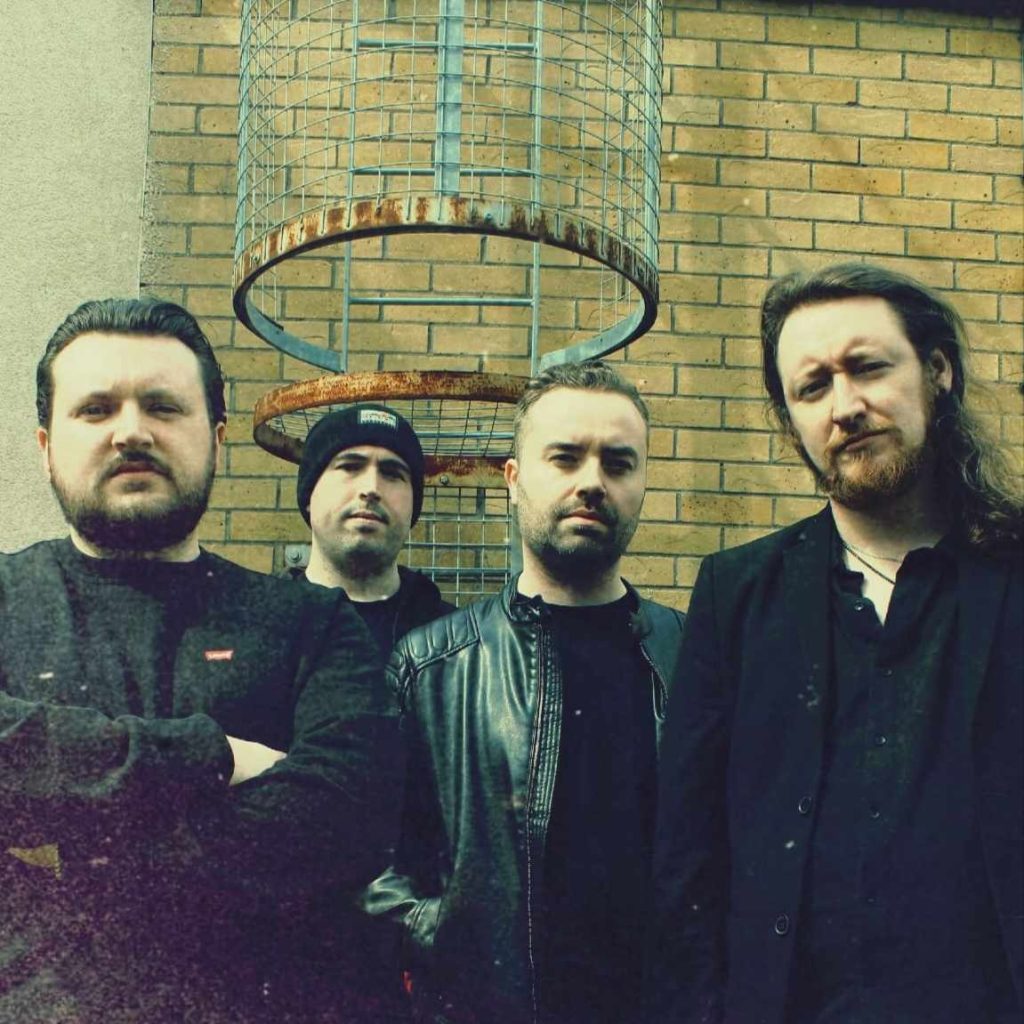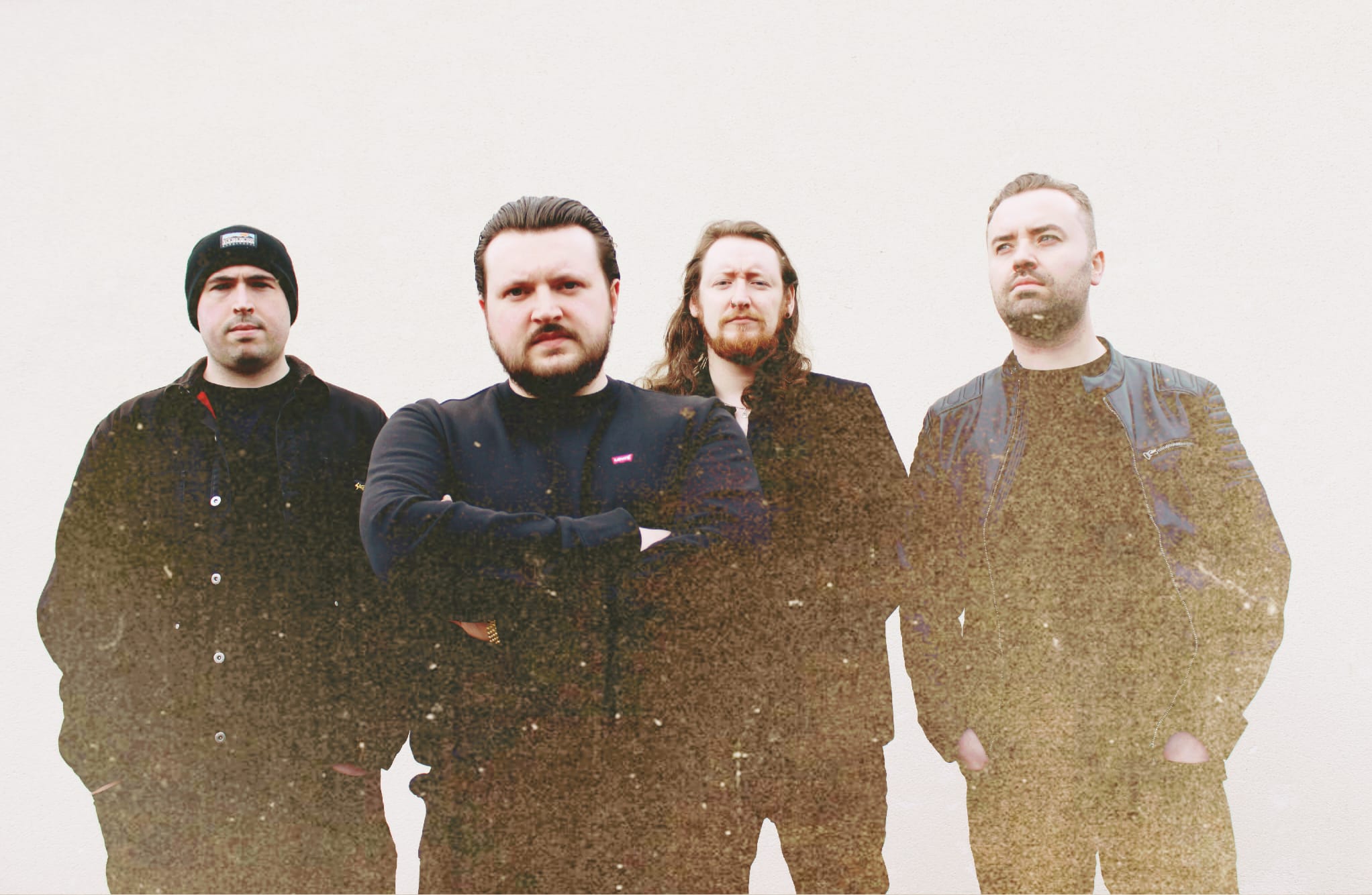Spearheaded by his dad, Dean Nolan grew up with music in his household. “He was a big Neil Young guy and was constantly writing songs,” Dean tells Post-Burnout. “While growing up, my dad would have a new song written and stuff – much to the chagrin of my mam – about his million different girlfriends prior and stuff. [Laughs] You know, there was a couple in there for her, as well, and stuff, but he was constantly writing about the world around him and stuff, and that’s sort of inspiring in its own way.
“[He enjoyed] acoustic-guitar songwriting [and] using it as a vehicle for expression rather than being a fantastic guitar virtuoso. He nearly disliked the electric guitar a little bit – and he’ll admit this, himself – simply because he can’t play it as well as acoustic. He just loves digging in and dragging the emotion out of an instrument, naturally.”
But Dean had no initial interest in following in his footsteps. “The minute I was born, he was trying to shove a guitar into my hand,” he says. “I loved music. I loved my memories of popping along in the truck… – he’s from the motor business – and popping along in the truck and listening to Tom Petty, and Budgie, and he was a huge Alex Harvey fan and stuff. So, I just got a huge, great dose of different backgrounds of rock and pop at the time, and I just loved music as it was, but I never wanted to play guitar.
“He kept trying to push it on me and push it on me until my mam came to him and said, ‘Would you just stop? If he doesn’t want to play guitar, he doesn’t have to,’ and he was like, ‘OK, OK.’ The minute he stopped pushing was the minute I picked up the guitar and started going to him, being like, ‘Am I holding this G chord right?’ and stuff. So, it was one of those push him away until you need to pull him back, sort of things.”
After learning how to play guitar, Dean soon joined his first band. He recalls, “So, I was fairly young getting into that – I was about 10 or 11 – and the minute I went into secondary school, one of my best friends was a drummer, and he was like, ‘Oh, you play guitar and you sing?’ So, I got dragged into a little garage band. They were called ‘The Punish’d’ at the time. [Laughs] Yeah, yeah. ‘Punish’d’ with no E; we had a little comma, instead!”
The Punish’d served as Dean’s introduction to collaborative music creation and execution. He spent his teenage years and twenties performing with different acts in various venues around Dublin, like Eamonn Doran’s and Sweeney’s. As those bands liquified and those venues sealed their doors for good, Dean’s passion didn’t dissolve with them.

Photographer uncredited
Photo courtesy of Empathy
Inspired by acts like The Smashing Pumpkins, Alice in Chains, and Queens of the Stone Age, in 2017, Dean began his latest project, Empathy, with his mate, drummer and former collaborator, Adam McCarthy. “So, Adam and myself would’ve played in different projects [since we were] young. 2017 is when we had Sam [Sweetman, their bassist] and Dan [Rheinisch, their guitarist] come onto the scene.
“Now, I say ‘come onto the scene;’ we’ve known them since we were young. Adam grew up on the same street as Sam, I went to school with them, and Dan hung around with the same musicheads as myself. It just all sort of clicked into place. It’s one of those things where we just got into a room and we knew exactly what we wanted to do.
“Unfortunately, just as we started getting ourselves into gear and stuff, COVID dropped. We’d always said to ourselves that if we were going to release and start throwing ourselves into all of this, we didn’t want to do it during COVID, simply because live performances are like your bread and butter, a little bit, and we weren’t going to be able to actually play and meet the people who would possibly listen to our music.
“That never really stuck quite right with me, that we’d be releasing music sort of as this nearly-faceless thing, basically. I want to get out there and play our music and have people say, ‘Hey! I like that! Where can I go?’, and I can say, ‘OK, now I’ll send you this way, to our music.’
“So, we spent the first three years gigging around, getting used to all the venues, testing out what material works, what doesn’t, and leaving a lot on the cutting room floor. We have so many songs that we’d play for months on end, and we’d judge it by how we’re reacting to it on stage, ourselves, and as soon as people in the crowd stop reacting to it and stuff, you have to put your ego aside and say, ‘This isn’t good enough,’ and you have to hold yourself to a certain standard.”
So, after seven years of existence, Empathy released their first song in August, called “Jeffrey,” a grunge tune about the serial killer Jeffrey Dahmer. “We fuckin’ missed that boat, I’m telling you, man!” jokes Dean about the resurgence of fascination with Dahmer from a couple of years ago. “We saw that Netflix [show] come out, we were looking at each other! […] Maybe we would’ve sped up the process a little bit and considered releasing during COVID if we knew about that in advance! [Laughs]”
Speaking on having music released that they can finally promote, Dean says, “It’s fantastic to actually just go, ‘Hey, take out your phone! We can show you where to go or tell you how to look us up,’ and stuff. That was always one of the big things holding us back, was that whole process of not being able to send people to a specific place. That’s such a huge help.”
And fans didn’t have to wait to get their hands on “Jeffrey”’s follow-up. Last Friday at the time of publishing, Empathy released their second single, “A Dying Breed.” “We record in bulk and then decide what to do, afterwards,” says Dean of their process. “Nearly what gets released will be the ones that are recorded in amongst each other, and then we’ll have one or two stragglers, but usually we won’t even lump them in, a little bit because we sort of find that when you leave a few months between recording songs and try to slam them together, they just sound different, you know?
“Because you’re in a different headspace. You’re playing differently, even. Depending on the music you’re listening to, it influences a little bit how you play your own instrument and you pick stuff up as you go along, even if you don’t mean to. We try to record all in bulk and release all at once. We have a lot built up in bulk, but that’s for another day.”
On choosing “A Dying Breed” as their follow-up single, Dean says, “We would’ve assessed what made an impression, and I would say, sonically – while ‘Jeffery’ is definitely a lot more in-your-face and everything – sonically, it captures what we did in the studio with that song, compared to ‘A Dying Breed.’ ‘A Dying Breed’ is a song that I think is your classic, sort of has pop wrapped into it, more standardised and everything, but it’s still very much fuckin’ hard, alternative rock music.”
Despite obvious allusions to yesteryear in their sound, Empathy are not adverse to diversity and modernity. “Our music is quite unapologetically influenced, sonically, by alternative music from the ‘90s and stuff,” Dean says, “but the type of music I’m listening to these days, like, I’m listening to a lot of country music! [Laughs]
“But you’re not going to hear that influence behind the songs. And a lot of more electro-goth, like The Soft Moon, and John Maus, and everything. They’re some of my favourites at the moment. Viagra Boys, fantastic. But that might influence how I’m going to initially write a song, but then, due to the collaborative way we get together and pick it back apart, it becomes something different.”
Empathy’s latest single, “A Dying Breed,” is on all streaming platforms now. You can find the band’s music, live dates, and social media accounts here.
Tune into POSTBURNOUT.COM Interviews… tomorrow to hear this interview in full. Available on YouTube, Spotify, Apple Podcasts, and Amazon Music Podcasts.

Aaron Kavanagh is the Founder and Editor-in-Chief of Post-Burnout. His writing can also be found in the Irish Daily Star, Buzz.ie, Totally Dublin, The GOO, Headstuff, New Noise Magazine, XS Noize, DSCVRD and more.

 POST-BURNOUT
POST-BURNOUT